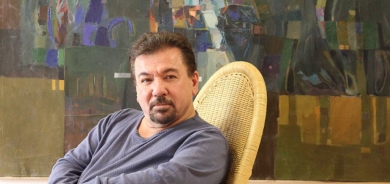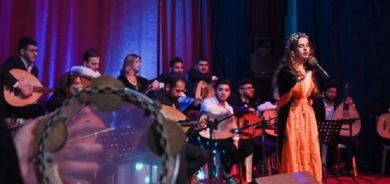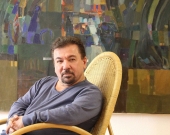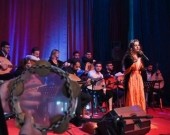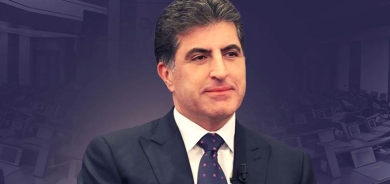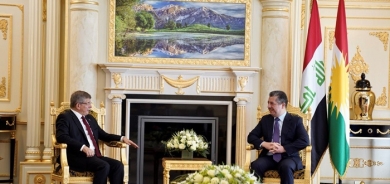Seamus Heaney is buried in Bellaghy, County Londonderry

Acclaimed by many as the best Irish poet since Yeats, the 74-year-old died in a Dublin hospital on Friday.
A funeral service was held earlier at the Church of the Sacred Heart, in Donnybrook, County Dublin.
NI's Deputy First Minister Martin McGuinness, Sinn Féin President Gerry Adams and the SDLP's John Hume were among those who attended the burial.
Mourners at the funeral service in Donnybrook included Bono, other members of U2, Irish Prime Minister Enda Kenny and Irish President Michael D Higgins.
Hollywood actor Stephen Rea, Paddy Moloney from the Chieftains, and singer-songwriter Paul Brady were among a number of high-profile figures from the arts world in the congregation.
'Final words'
The mourners were led by the poet's widow, Marie, and their three children, Christopher, Michael and Catherine Ann.
Addressing the congregation, Michael said the family had drawn strength from the many messages of support they had received in the days since his father's death was announced.
"His generosity in spirit as well as obvious gifts as poet left everyone who met him feeling lucky to have known him," he said.
"In his last few words, in a text message he wrote to my mother minutes before he passed away, were in his beloved Latin, and they read: 'Noli timere', don't be afraid."
Monsignor Brendan Devlin, principal celebrant, said the family were suffering an "immeasurable sense of loss".
'Christian optimism'
The poet's brother, Pat Heaney, niece Sarah Heaney and his brother-in-law Barry Devlin, from the Irish Celtic rock band Horslips, were among the family members who took part in the ceremony.
Msgr Devlin told mourners: "In our natural consternation in the presence of death and the termination of our earthly supports, we can only turn our eyes on life in that spirit of Christian optimism which, it seems to me, breathes in much of the work of Seamus Heaney and which I believe to be his inheritance from our troubled past."
He described the poet as as "brilliant literary critic" and an "articulator of the years of pain" in his native Northern Ireland.
He added he was a "great democrat" who could speak to the King of Sweden or an Oxford Don or a south Derry neighbour".
Msgr Devlin, from County Tyrone, also said he believed Heaney would have "liked his funeral mass to be celebrated with a northern accent".
A book of Heaney's poetry was brought to the altar during the offertory procession.
'Big-hearted'
His poem The Given Note was read by his fellow poet and publisher, Peter Fallon, before prominent Irish traditional musician Liam O'Flynn played Port na bPúcaí (Tune of the Fairies) on the uilleann pipes.
Poet Paul Muldoon paid a very personal tribute to Heaney as "big-hearted", "bounteous" and "bouncy" man, as he relived fond memories of playing Gaelic football with the poet and his children.
"I have to tell you that I speak, humbly, as someone who has been shoulder-charged by Seamus Heaney. He bounced me off, like snow off a plough or whatever. He rebuffed me benignly," Mr Muldoon said.
"The Seamus Heaney who was renowned the world over was never a man who took himself too seriously, certainly not with his family and friends," he added.
"After all, he had that signal ability to make each of us feel connected not only to him but to one another."
Mourners who lined the street outside the church applauded as the poet's coffin was driven away.
Books of condolence are being opened in Belfast and Dublin. Another opened at the Guildhall in Derry on Saturday.
A celebration of the poet's life at Belfast's Lyric theatre on Saturday night was packed to capacity as the audience was treated to poignant recitals of his best-known works.
Heaney was awarded the Nobel Prize for Literature in 1995 "for works of lyrical beauty and ethical depth, which exalt everyday miracles and the living past".
Over his long career he was awarded numerous prizes and received many honours for his work.
Heaney recently suffered from ill health.
His 2010 poetry collection The Human Chain was written after he suffered a stroke, and the central poem, Miracle, was directly inspired by his illness.
BBC



